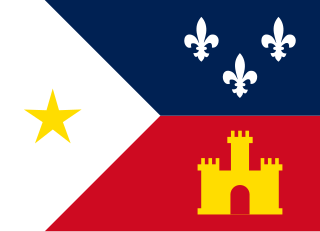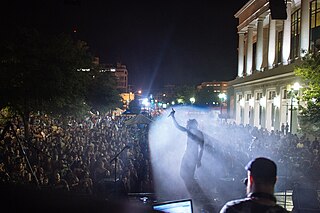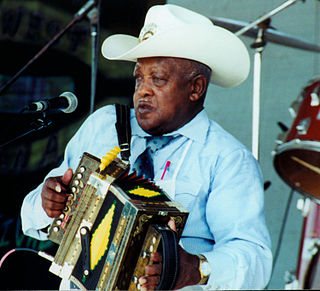This article needs additional citations for verification .(November 2012) |
Zydeco Force was an American Creole zydeco band from Opelousas, Louisiana, United States. Zydeco Force is best known for its tracks "Hey Madeline" and "B-Flat". [1]
This article needs additional citations for verification .(November 2012) |
Zydeco Force was an American Creole zydeco band from Opelousas, Louisiana, United States. Zydeco Force is best known for its tracks "Hey Madeline" and "B-Flat". [1]
The band consisted of Robby Robinson, Raymond Thomas, and the two sons of Lawtell Playboys frontman Delton Broussard: Shelton and Jeffery Broussard, and Delton's nephew Herbert Broussard. [2] They formed in 1989 and became a regional hit across Louisiana and East Texas. The band was featured in the award-winning German film, Schultze Gets the Blues,[ citation needed ] filmed in the former East Germany and in Texas and Louisiana.
Jeffery Broussard has his own band, Jeffery Broussard & The Creole Cowboys. They have performed worldwide, and appeared at the Augusta Heritage Festival, in Elkins, West Virginia, during Augusta's Cajun/Zydeco week in various years, as well as New Orleans Jazz & Heritage Festival. They continue to perform for many other festivals and live venues from coast to coast.
Zydeco Force guitarist Shelton Broussard died on November 6, 2012, during a fire at his home, aged 49. [1]

The Cajuns, also known as Louisiana Acadians,, are an ethnic group mainly living in the U.S. state of Louisiana.
Zydeco is a music genre that evolved in southwest Louisiana by French Creole speakers which blends blues, rhythm and blues, and music indigenous to the Louisiana Creoles and the Native American people of Louisiana. Although it is distinct in origin from the Cajun music of Louisiana, the two forms influenced each other, forming a complex of genres native to the region.

Sidney Simien, known professionally as Rockin' Sidney, was an American R&B, zydeco, and soul musician who began recording in the late 1950s and continued performing until his death. He is best known for his 1985 single "My Toot-Toot", which reached top 20 on the Billboard Hot Country Songs charts and earned him a Grammy Award.
The music of Louisiana can be divided into three general regions: rural south Louisiana, home to Creole Zydeco and Old French, New Orleans, and north Louisiana. The region in and around Greater New Orleans has a unique musical heritage tied to Dixieland jazz, blues, and Afro-Caribbean rhythms. The music of the northern portion of the state starting at Baton Rouge and reaching Shreveport has similarities to that of the rest of the US South.

Cajun music, an emblematic music of Louisiana played by the Cajuns, is rooted in the ballads of the French-speaking Acadians of Canada. Although they are two separate genres, Cajun music is often mentioned in tandem with the Creole-based zydeco music. Both are from southwest Louisiana and share French and African origins. These French Louisiana sounds have influenced American popular music for many decades, especially country music, and have influenced pop culture through mass media, such as television commercials.

BeauSoleil is a Cajun band from Louisiana, United States.

Clifton Chenier, a Louisiana French-speaking native of Leonville, Louisiana, near Opelousas, was a performer and recording artist of zydeco, which arose from Cajun and Creole music, with R&B, jazz, and blues influences. He played the accordion and won a Grammy Award in 1983.

The Festival International de Louisiane is an annual music and arts festival held in Lafayette, Louisiana celebrating the French heritage of the region and its connection to the Francophone world. The festival was first held in 1987 and has become very popular, attracting musicians, artists, and craftsmen from around the world. The festival is held outdoors, in Downtown Lafayette, the last full weekend in April, and is free to the public. Estimates for attendance include 400,000 in 2016. The festival was voted the "Best World Music Festival" by About.com readers in their 2012 and 2013 Readers' Choice Awards. 2020 saw a virtual event as the COVID-19 pandemic was to blame.
Maison de Soul is a Louisiana-based Zydeco and blues record label. It was founded in 1974 in Ville Platte, Louisiana by Floyd Soileau and remains under his ownership. It is one of four record labels under Soileau's Flat Town Music Company umbrella, and combined the Flat Town labels make up "the largest body of Cajun, zydeco, and swamp music in the world". Living Blues magazine has called Maison de Soul "the country's foremost zydeco label".

Wilson Anthony "Boozoo" Chavis was an American accordion player, singer, songwriter and bandleader. He was one of the pioneers of zydeco, the fusion of Cajun and blues music developed in southwest Louisiana.

Beau Jocque was a Louisiana French Creole zydeco musician and songwriter active in the 1990s.

Rosie Ledet is an American Creole Zydeco accordion player and singer.

C. J. Chenier is the Creole son of the Grammy Award-winning "King of Zydeco", Louisiana musician, Clifton Chenier. In 1987, Chenier followed in his father's footsteps and led his father's band as an accordion performer and singer of zydeco, a blend of cajun and creole music. With five previous albums to his credit, by 1994, Chenier began to record for Chicago-based Alligator Records.
Calvin Carriére was an American, Creole fiddler, who played zydeco music. He was styled the 'King Of Zydeco Fiddle'.

Cajun music has its roots based in the ballads of the French-speaking Acadians of Canada, and in country music.

Cedric Watson is an American musician. He has been nominated four times for Grammy Awards.

Sean Ardoin is an American Zydeco musician, singer and three-time Grammy Award nominee.
Lynn August is an American zydeco accordionist, keyboard player, singer and bandleader.
Inez Catalon was an American Creole ballad singer, who was one of the most well-known performers of the genre known as Louisiana "home music". These are a cappella versions of ballads and love songs, drinking songs, game songs, lullabies and waltzes performed by women in the home, passed down from earlier generations to provide entertainment for the family before radio and television existed. Home music is not considered part of the public performance repertoire of Cajun and zydeco music because the songs were sung in the home by women, rather than in the dance halls of southwestern Louisiana which featured almost exclusively male performers.